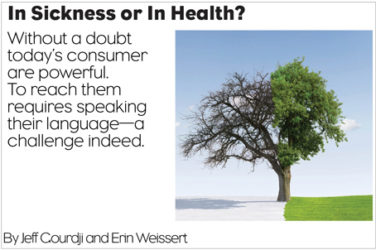Having weathered the Great Recession in 2008-2009 and the Pandemic Recession in 2020, I have experienced firsthand healthcare advertising’s resilience, while colleagues in other industries sadly suffered. Despite today’s economic uncertainty, I’m optimistic healthcare advertising will once again be recession proof for four reasons:
1. Consumers won’t compromise their health and wellness.
Eighty percent of global consumers expect to maintain or increase health and wellness spending this year, despite 66% also feeling financially squeezed (Accenture, 2022).1 They want personalized solutions for essential health needs—physical, mental, lifestyle, sleep, and other self-care behaviors. These needs are fueling new competition to drive the industry forward.
2. Healthcare professionals desperately need relief.
Today, 53% of U.S. physicians report burnout, up from 42% in 2018 (Medscape, 2023).2 The #1 reason is overload—feeling forced to work at an unsustainable pace. Brands need to choose: Do we want to be the problem or the solution? To help keep physicians in practice, marketers should think beyond product to create human-centered services and support. Their brands will differentiate if they help make physicians’ careers more manageable and reconnect them with their personal purpose.
3. Clients are playing catch-up when it comes to modern marketing.
While customer experience (CX) defines this generation of marketing, the healthcare sector lags. Many brands are stuck relying on high-spend, mass advertising and sales-centric professional promotion. Recession or not, CX investment must happen now to future proof success.
In practice, this means omnichannel creative engagement that approaches consumers and physicians as dynamic, multi-dimensional humans. Clients should adopt a unified methodology for engaging customers throughout their journeys. Data tell us this is great for the bottom line and millions of customer outcomes.
4. Demands for health equity will only get louder.
If the economy goes south, smart, compassionate brands won’t kick the can down the road. They’ll double down on helping underrepresented, underserved groups survive a recession disproportionately burdening them. They’ll invest in community outreach and new data sources to shed light on diverse consumer and physician needs. With new insights, brands will better meet these needs at scale.
Our industry must also support emerging brands with diversity in their DNA. For example, FemTech is expected to be a $75 billion global industry by 2025.3 Now is a great time to get behind startups addressing women+ health needs that have been long ignored—or even worse—stigmatized, such as mensuration care, pregnancy and postpartum support, menopause care, and behavioral health.
While a future recession will make old ways further obsolete, healthcare advertising will grow by addressing these four needs. If we as healthcare marketers do this collaboratively with purpose and passion, we should emerge stronger and more impactful than ever before.
References:
1. “Consumers See Health and Well-being as ‘Essential’ Spend Category, Accenture Survey Finds.” Accenture. 7 Sept. 2022. Source: https://newsroom.accenture.com/news/consumers-see-health-and-well-being-as-essential-spend-category-accenture-survey-finds.htm.
2. “U.S. Physician Burnout & Depression Report, 2023.” Medscape. Source: https://www.medscape.com/slideshow/2023-lifestyle-burnout-6016058.
3. “FemTech Market Overview.” FemTech Analytics. 2023. Source: https://www.femtech.health/femtech-market-overview.









